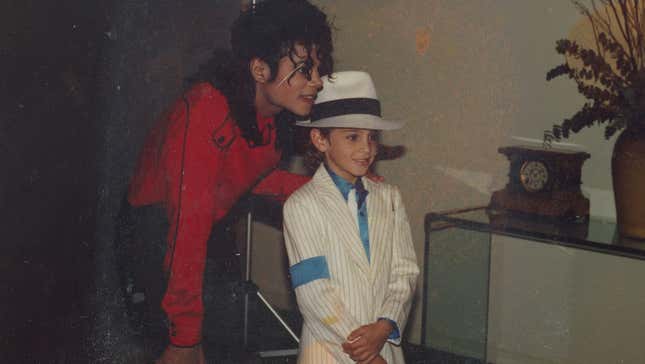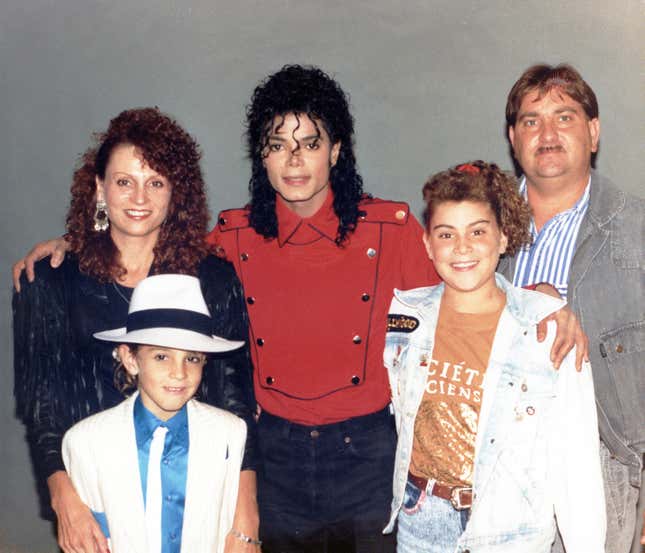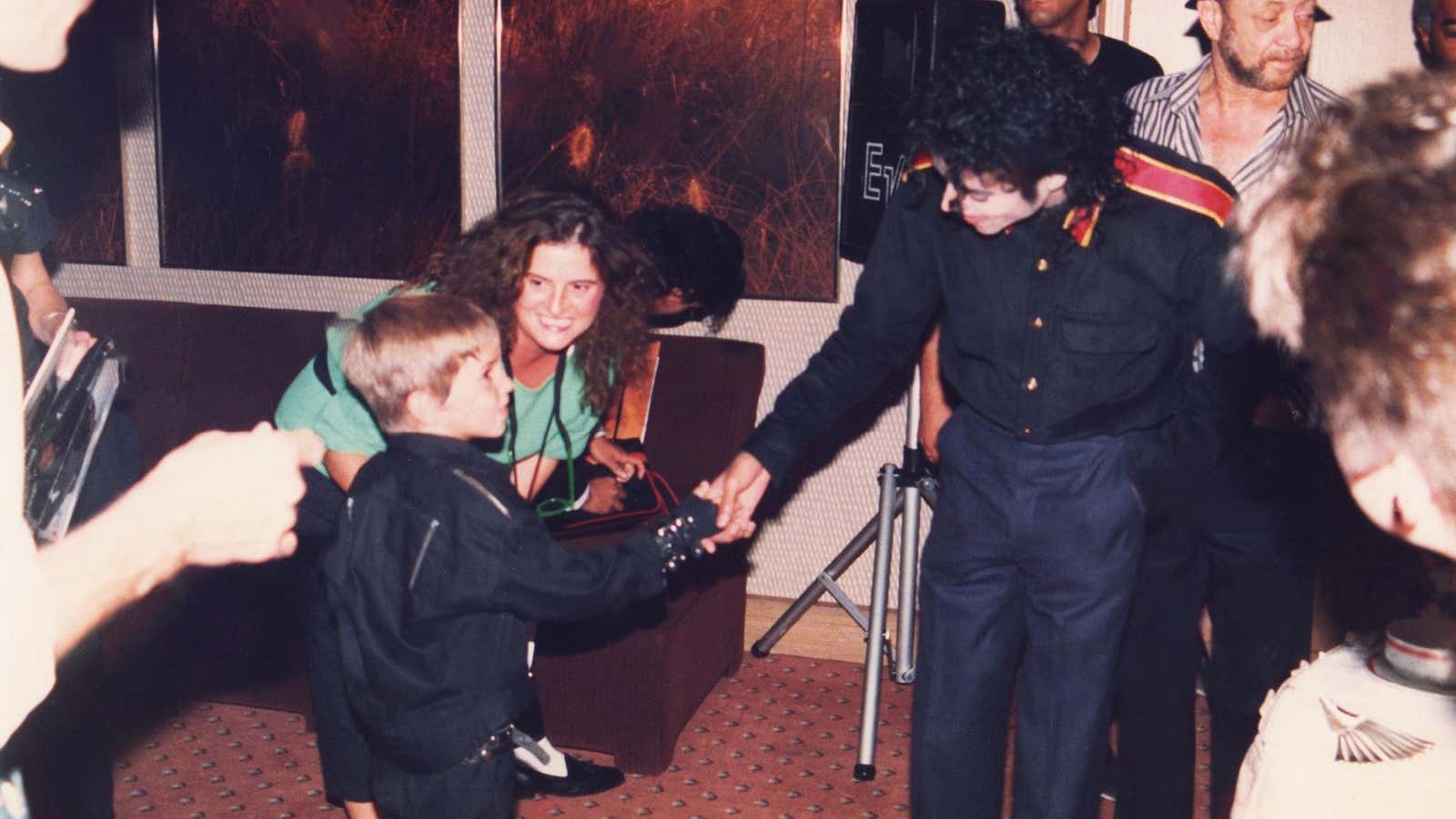Michael Jackson has been accused of molesting children multiple times, and each time his legacy has survived. He settled with his first alleged victim out of court in 1993, and then went on to conduct one of the biggest global music tours in history two years later. In 2005, he beat the charges levied against him in a widely publicized trial, stemming from a second set of allegations. When he died four years after that, his funeral was watched online by more than 31 million Americans, and attended in person by a who’s who of famous musicians, politicians, actors, and athletes.
Jackson was dead, but his music and the adoration of his fans would live on forever. Maybe the most beloved musician in history—a genre-jumping, global icon—he was too big to fail. HBO’s documentary Leaving Neverland could finally change all of that.
Over four hours (part two airs tonight), the documentary paints a damning, highly credible case alleging a long pattern of child sexual abuse perpetrated by Jackson. Two men, Wade Robson and James Safechuck, allege in harrowing interviews that after Jackson befriended them when they were children in the 1980s, they were sexually abused by the pop star.
The two men’s experiences are eerily similar: Both were groomed and spoiled by Jackson, who showered them with gifts, vacations, shopping trips, and, most important of all, his attention. They were invited for extended stays—with and without family members—to Jackson’s massive, isolated southern California property Neverland Ranch, where they’d sleep in the same bed as Jackson. Soon, both said, Jackson taught them how to masturbate, showed them graphic pornography, and engaged in sexual acts with them, including kissing, fondling, and oral sex. Robson was seven and Safechuck was 10 when they allege the abuse began.

Jackson sent faxes to Robson, expressing his love for the young boy, whom he called “little one.” The pop star would allegedly call the boy’s home every day for years, and the two would talk for hours each time. As Jackson got closer to Robson, the boy would grow further apart from his family, who had left Australia and moved to the United States so Wade, an aspiring performer, could take advantage of his connection to the pop star. Jackson allegedly insisted that both boys not trust anyone else other than him, including their own parents. Robson said that Jackson told him they would both go to jail if anyone found out what Jackson was doing.
Robson and Safechuck’s testimony describes a man whose alleged abuse was premeditated and carefully planned. Jackson had some sort of alarm outside his bedroom that would go off if anyone was about to enter. He’d send the boys’ parents away so that he could have access to the children at Neverland without supervision. The men alleged that Jackson forced them to run “drills” to get dressed as fast as possible in case someone was about to walk in on them having sex. Their claims are as convincing as they are disturbing.
Leaving Neverland leaves no doubt. It is a stunning and devastating indictment of Jackson, portraying the pop star as someone who manipulated young children and exploited his stature as a larger-than-life celebrity role model to prey on them over a long period of time. Jackson knew what he meant to these children, the documentary asserts, and he brainwashed them to such a degree that they didn’t understand what was happening to them was wrong.
In 2005, Robson had testified on Jackson’s behalf, and his testimony was credited in part with exonerating Jackson. (The actor Macaulay Culkin, who also had a friendship with Jackson when he was a child, was a star witness for the defense, and has long said Jackson never molested him. Despite the denials, Culkin’s testimony during the trial corroborated Robson and Safechuck’s claims of an alarm bell outside Jackson’s room. Culkin is not interviewed in the documentary.)
Safechuck declined to testify. He alleged in the documentary that Jackson threatened him when he told the musician that he wasn’t interested in appearing at the trial.

Robson and Safechuck both recall feeling jealous when they approached puberty and were quickly “replaced” by other young boys as Jackson’s best friends. It wasn’t until recently that Robson fully came to terms with the abuse he allegedly suffered. “This is not a case of repressed memory,” Robson told Today in 2013. “I never forgot one moment of what Michael did to me, but I was psychologically and emotionally completely unable and unwilling to understand that it was sexual abuse.”
Leaving Neverland is an incredibly difficult watch for several reasons, not least because it implicitly condemns the public for watching and accepting Jackson’s bizarre public behavior around children, writing it off as just an element of his infantile, whimsical personality (or excusing it as the result of his own long-rumored abuse by his father, Joe). Jackson constantly surrounded himself with young boys, held their hands in public, and freely admitted to sleeping in the same bed with them.
Whatever doubt Jackson fans allowed themselves, the HBO documentary utterly demolishes it. The truth is in Wade Robson’s eyes as he discusses how the alleged abuse left him empty, distant, emotionally inert as an adult. The truth is in James Safechuck’s shaking hand as he shows the interviewer a ring Jackson gave him when he was a boy during a mock wedding ceremony.
Viewers will decide for themselves what happens next. Perhaps they’ll think of Robson and Safechuck and the other alleged victims whenever a Jackson song comes on the radio. Perhaps they’ll stop listening to Jackson’s music altogether. Perhaps they’ll retreat deeper into fanaticism, as some fans are doing, and once again accuse the accusers of trying to make a quick buck at the singer’s expense.
It’s too early to make a grand pronouncement about what Jackson’s legacy will ultimately be in light of this documentary, but we know it won’t be the same tomorrow as it was on Saturday.
